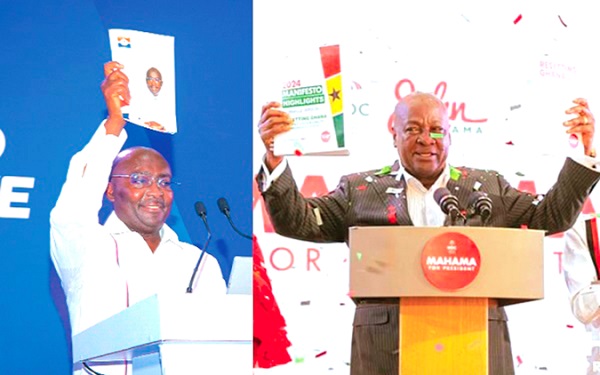
Navigating the political terrain: Promises and realities in Ghana’s Fourth Republic
As we delve into Ghana’s vibrant political tapestry, one cannot ignore the powerful imagery encapsulated in the poem “Dog Eat Dog,” recently shared on social media by a passionate Ghanaian writer, Amma Birago.
This evocative phrase reflects the fierce competition and survival instincts that characterise the political landscapes of Ghana and many emerging democracies.
With elections approaching, the air thickens with tension, each citizen nurturing a deep yearning for transformation after enduring prolonged political discontent. Just like the residents of the fictitious nation depicted in the poem, many Ghanaians feel akin to “refugees” in their homeland, struggling against not only the loss of material wealth but also the erosion of hope.
Campaign
The ruling New Patriotic Party (NPP) and the opposition National Democratic Congress (NDC) stand poised to engage voters, each brandishing manifestos and campaign jingles promising economic revival and societal advancement.
In a manner reminiscent of the fervent declarations made by incumbent parties seeking to reaffirm their mandate, the NPP has outlined ambitious initiatives to revitalise the economy.
They promise a digital economy, job creation and infrastructure investment, pledging to rekindle the aspirations of a populace desperate for change. Yet, one must remain vigilant; amid the optimism, there lurks a pervasive shadow of disillusionment.
The spectre of past failures looms large and many voters find themselves in a familiar predicament: choosing a candidate feels much like a gamble—often, the refrain “do not waste your vote” echoes through conversations in homes and markets, a reminder of the burdens borne from previous disappointments.
Unfulfilled promises
This cultural mindset, shaped by a history of unfulfilled promises, compels Ghanaians to reclaim their agency even as they navigate through layers of despair. At polling stations, each ballot represents not only a hope for a better future but a wariness born from collective experience. The sentiment is palpable; every decision carries the weight of expectation and scepticism, a testament to the unease that resonates throughout the electorate. In this high-stakes political landscape, genuine change often feels tantalisingly out of reach.
As the NDC enters the fray with their “Resetting Ghana” manifesto with a promised 24-hour economy to fix Ghana’s ailing economy, advocating social justice and measures against corruption, the electorate remains cautious. The echoes of past failures such as the infamous judgement debt scandal or the persistent power crises, linger in the minds of voters, fostering disbelief that any new promises could indeed signal a departure from historical disappointments. The NDC’s commitment to transparency and accountability, while laudable, faces the challenge of convincing a populace weary of rhetoric and eager for real change. Indeed, it has become increasingly clear that the spoils of political victory tend to gravitate towards the political elite, leaving the average citizen confronted with little more than empty assurances amidst their struggle for a rightful place within the framework of democracy.
In this charged atmosphere, the relentless power struggle unfolds between the NPP and the NDC, paralleling the narrative of “Dog Eat Dog,” wherein misinformation and sensationalism dominate the political arena.
Engagement
As candidates take to social media with exaggerated claims and half-truths, voters often find themselves sidelined, feeling trapped in a game devoid of genuine civic engagement. Issues such as youth unemployment, poor healthcare systems and inadequate education remain chronic problems, yet often take a backseat to empty promises during campaign cycles.
Meanwhile, amidst the whirl of political machinations, the voices of ordinary Ghanaians rise in solidarity. Grassroots movements and civil society organisations actively advocate accountability and reform, echoing the urgent call for equitable representation. Initiatives led by concerned citizens such as the “#FixTheCountry” campaign, showcase a burgeoning civic consciousness, illustrating a collective demand for action despite the political chaos.
As Ghanaians prepare to cast their votes, they cling to the flickers of hope that persist under the surface, resonating with the poignant message of the poem. True progress hinges upon a paradigm shift—from mere survival instincts to a collaborative vision for development. The road ahead for Ghana is undoubtedly complex, yet the voices of its citizens hold the power to reshape the political culture, ensuring that promises evolve from mere rhetoric into tangible commitments that inspire real change.
Aspirations
Ultimately, the resilience of the populace remains the bedrock of hope. Aspirations for a fairer tomorrow fuel the relentless pursuit of justice amid the tumult of political strife. As Ghanaians unite in anticipation, their voices—echoing across borders and shared experiences—await the opportunity to forge a new path towards meaningful representation, where every citizen is empowered to play an active role in the political theatre of their own making. In this unfolding narrative, the quest for genuine progress becomes not just a dream but a tangible reality waiting to be realised.
The link to the poem, Dog Eat Dog can be found here http://dagnyzenovia.com/2024/11/21/dog-eat-dog-two-sides-of-the-same-coin-a-poem-that-makes-you-think/
The writer is a political scientist

 Click the link to read your copy.
Click the link to read your copy.